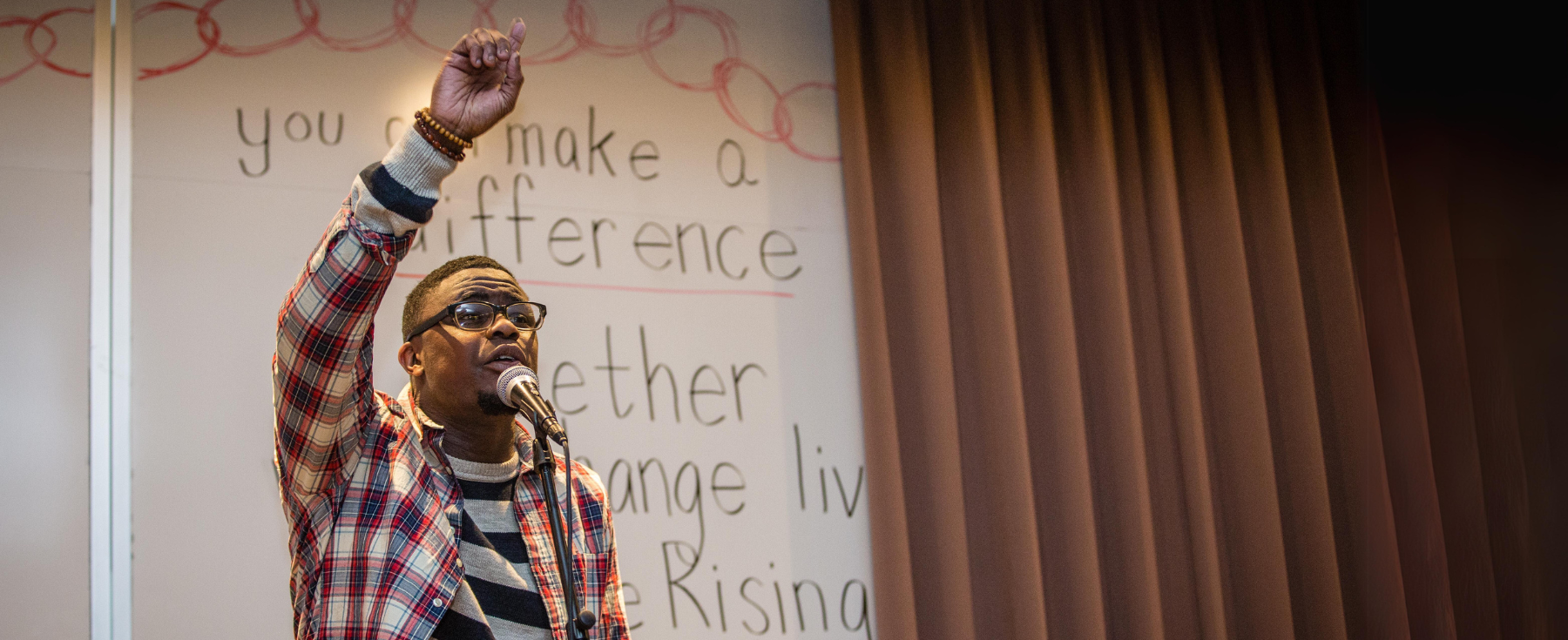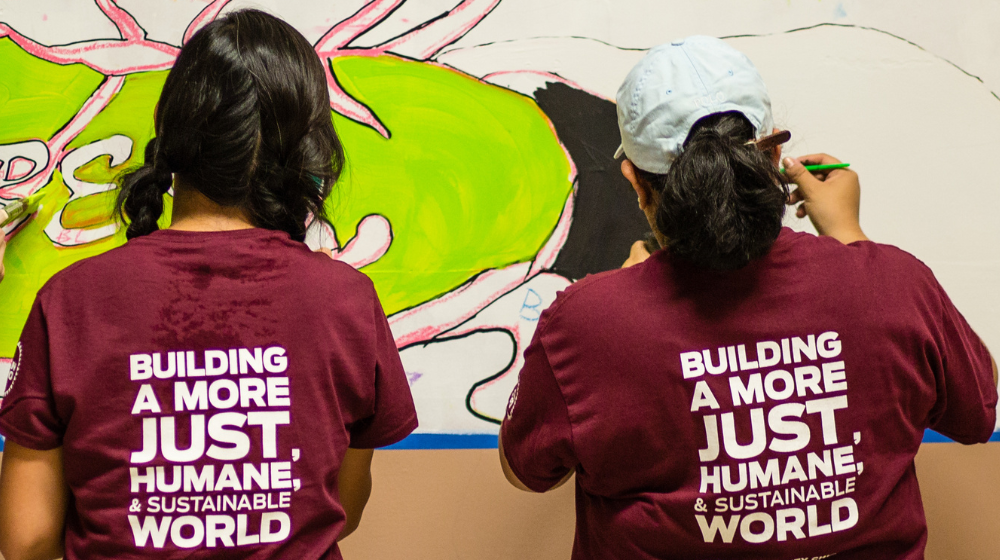
Combating Racism
Combating Injustice
FORGING AN IMPORTANT PATH TOWARD A WORLD WITHOUT RACISM
In the classroom and beyond, Loyola School of Education faculty and students have been forging an important path toward a world without racism. Whether it be in lecture halls, on YouTube, or in nationally recognized news outlets, members of the School of Education community stand on the front lines of developing a more just and equal society for all.
Professor and Co-Chair for Counseling Psychology, Dr. Matt Miller is a 2001 and 2005 graduate from the School of Education. “As a student here, I was learning that our work as scholars should help to address inequities. If we aren’t working to advocate for oppressed members of our communities, we’re missing opportunities to make a difference,” says Miller.
Since graduating from Loyola, Miller has participated in scholarly work at various institutions, yet he returned home to Loyola because of the university’s proactive engagement with society and its drive for justice. “I believe Loyola is trying to figure out how to be a light in the world, and that does make a difference. I came back here in large part because my experience as a student was very meaningful in terms of supporting equity work and research. Here, that’s celebrated and accepted in a way that is not common,” says Miller
"As a student here, I was learning that our work as scholars should help to address inequities." Dr. Matt Miller, Professor and Co-Chair for Counseling Psychology
At Loyola, Miller directs the Race, Culture, and Health Equity Lab where he provides research mentorship to his students. Inside the lab, he and his students do work for Miller’s public scholarship effort, SPOKENproject. SPOKENproject is a filmmaking, digital storytelling platform that works to engage communities to cope with and heal from racism in a relevant, real-world way. Miller sees YouTube videos as a common way that everyday people connect, so he uses this platform to teach, validate, and empower diverse ways of handling racism and recovering from its negative effects.
The inspiration for SPOKENproject came about when Miller felt his career success was not all that he wanted–as a scholar who cared deeply about equity and justice, Miller wanted to be helping others. After publishing a video about a former student’s experience surviving sexual assault, the positive feedback was wowing. It was clear that this project resonated with people, and that is exactly what Miller hopes to do through his work. “All of the time that I spend on research, I primarily focus on doing SPOKENproject and related work,” says Miller.

Miller's SPOKENproject uses videography to share uniting stories of overcoming racial injustices.
When he’s not devoting his time to his research work, Miller collaborates with colleagues and students; at the back of his mind, he focuses on unlearning systems of oppression that perpetuate injustice. Miller also incorporates messages of his unlearning with his students in the classroom. “By modeling that and talking about my own trajectory as a scholar and an academic, I try to help students see if they have similar experiences and could have similar questions or approaches to conversations,” says Miller. “I try to give my students proactive permission to question everything they’re hearing–including the things I’m saying–and put it through the critical lens to see if there are concerns. If students are doing that, I consider that a successful outcome.”
Miller is not alone in recognizing the importance of justice. Tiffany Fang, a doctoral candidate in counseling psychology, works with Miller, her advisor, on the SPOKENproject. “We interview a lot of people to learn about how they cope with racism and how they find hope with everything that’s going on,” says Fang.
“I try to give my students proactive permission to question everything they’re hearing–including the things I’m saying..." Dr. Matt Miller, Professor and Co-Chair for Counseling Psychology
Along with the SPOKENproject, Fang has also used writing to integrate her knowledge of psychology and racism. Her op-ed piece, “The killing of 6 Asian women in Atlanta rocked me. I know where that animus comes from,” was published in the Chicago Tribune in February 2022 to commemorate the one-year anniversary of the Atlanta spa shootings. “It was something that was in my mind and on my heart, so it wasn’t hard to write,” says Fang.
After being published in the Chicago Tribune, Fang also filmed a video of her reading her work for SPOKENproject. The piece circulated and spread her powerful message remembering the tragic event and how it impacted her. “It’s definitely something that I’m really proud of,” says Fang.
At the School of Education, Fang has learned to think systemically–understanding that societal systems are to blame for issues of oppression and prejudice, rather than a single individual. This has been a beneficial lesson learned throughout her education.

Justice is a core value of Loyola Univeristy Chicago.
Fang also credits Loyola’s faculty as playing an integral role in her commitment to social justice. “All of our faculty are people of color who are actively engaged in social justice. Having access to people who have been doing this work for a long time has been invaluable,” says Fang.
The tremendous work being done within the School of Education is shedding important light on the necessary changes that face today’s society. Loyola is an institution that promotes education as a tool that changes lives and creates a more just world; it is clear that the School of Education is doing exactly that.
To read Fang’s op-ed in the Chicago Tribune, click here.
To learn more about SPOKENproject, click here.
Story by Kate Roudebush
In the classroom and beyond, Loyola School of Education faculty and students have been forging an important path toward a world without racism. Whether it be in lecture halls, on YouTube, or in nationally recognized news outlets, members of the School of Education community stand on the front lines of developing a more just and equal society for all.
Professor and Co-Chair for Counseling Psychology, Dr. Matt Miller is a 2001 and 2005 graduate from the School of Education. “As a student here, I was learning that our work as scholars should help to address inequities. If we aren’t working to advocate for oppressed members of our communities, we’re missing opportunities to make a difference,” says Miller.
Since graduating from Loyola, Miller has participated in scholarly work at various institutions, yet he returned home to Loyola because of the university’s proactive engagement with society and its drive for justice. “I believe Loyola is trying to figure out how to be a light in the world, and that does make a difference. I came back here in large part because my experience as a student was very meaningful in terms of supporting equity work and research. Here, that’s celebrated and accepted in a way that is not common,” says Miller
At Loyola, Miller directs the Race, Culture, and Health Equity Lab where he provides research mentorship to his students. Inside the lab, he and his students do work for Miller’s public scholarship effort, SPOKENproject. SPOKENproject is a filmmaking, digital storytelling platform that works to engage communities to cope with and heal from racism in a relevant, real-world way. Miller sees YouTube videos as a common way that everyday people connect, so he uses this platform to teach, validate, and empower diverse ways of handling racism and recovering from its negative effects.
The inspiration for SPOKENproject came about when Miller felt his career success was not all that he wanted–as a scholar who cared deeply about equity and justice, Miller wanted to be helping others. After publishing a video about a former student’s experience surviving sexual assault, the positive feedback was wowing. It was clear that this project resonated with people, and that is exactly what Miller hopes to do through his work. “All of the time that I spend on research, I primarily focus on doing SPOKENproject and related work,” says Miller.
When he’s not devoting his time to his research work, Miller collaborates with colleagues and students; at the back of his mind, he focuses on unlearning systems of oppression that perpetuate injustice. Miller also incorporates messages of his unlearning with his students in the classroom. “By modeling that and talking about my own trajectory as a scholar and an academic, I try to help students see if they have similar experiences and could have similar questions or approaches to conversations,” says Miller. “I try to give my students proactive permission to question everything they’re hearing–including the things I’m saying–and put it through the critical lens to see if there are concerns. If students are doing that, I consider that a successful outcome.”
Miller is not alone in recognizing the importance of justice. Tiffany Fang, a doctoral candidate in counseling psychology, works with Miller, her advisor, on the SPOKENproject. “We interview a lot of people to learn about how they cope with racism and how they find hope with everything that’s going on,” says Fang.
Along with the SPOKENproject, Fang has also used writing to integrate her knowledge of psychology and racism. Her op-ed piece, “The killing of 6 Asian women in Atlanta rocked me. I know where that animus comes from,” was published in the Chicago Tribune in February 2022 to commemorate the one-year anniversary of the Atlanta spa shootings. “It was something that was in my mind and on my heart, so it wasn’t hard to write,” says Fang.
After being published in the Chicago Tribune, Fang also filmed a video of her reading her work for SPOKENproject. The piece circulated and spread her powerful message remembering the tragic event and how it impacted her. “It’s definitely something that I’m really proud of,” says Fang.
At the School of Education, Fang has learned to think systemically–understanding that societal systems are to blame for issues of oppression and prejudice, rather than a single individual. This has been a beneficial lesson learned throughout her education.
Fang also credits Loyola’s faculty as playing an integral role in her commitment to social justice. “All of our faculty are people of color who are actively engaged in social justice. Having access to people who have been doing this work for a long time has been invaluable,” says Fang.
The tremendous work being done within the School of Education is shedding important light on the necessary changes that face today’s society. Loyola is an institution that promotes education as a tool that changes lives and creates a more just world; it is clear that the School of Education is doing exactly that.
To read Fang’s op-ed in the Chicago Tribune, click here.
To learn more about SPOKENproject, click here.
